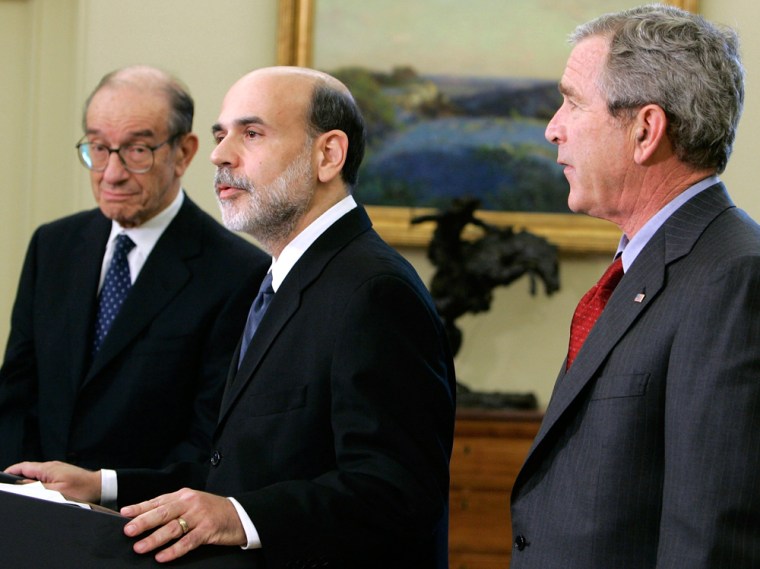With his years of work teaching and studying monetary economics, service as a Federal Reserve governor and brief tour of duty in the Bush White House, Ben Bernanke has spent nearly his entire career preparing for this day.
A straight-talking Ivy League economist with a reputation for eschewing political ideology, Bernanke, 51, commands wide respect in the economics community and has long been the insiders’ choice to lead the U.S. central bank.
Five years ago, Bernanke posed the prescient question in an op-ed in The Wall Street Journal, “What Happens When Greenspan is Gone?”
On Monday, President Bush answered, nominating Bernanke to replace Fed Chairman Alan Greenspan after an 18-year term that has made him an icon from the halls of the Congress to Main Street, U.S.A.
“He’s got strong research credentials on both analytical work and economic history and clearly his service at the Fed has familiarized him with a lot of the nuts and bolts of the job,” said Michael Prell, former director of research at the Fed Board. “He’s shown himself to be a student of the practical tasks of current analysis and forecasting.”
Born in Georgia and raised in Dillon, S.C., Bernanke was an academic star. In sixth grade, he won the state spelling bee but missed higher acclaim when he faltered on the word “edelweiss,” a flower. He got a score of 1,590 on his SAT out of a possible 1,600, taught himself calculus in high school and then focused on economic numbers at Harvard.
After graduating summa cum laude from the Ivy League university in 1975, Bernanke continued his studies at the Massachusetts Institute of Technology, where he received his doctorate four years late. His focus during his years in Boston were the underpinnings of the Great Depression and the losing ways of the city’s beloved baseball team, the Red Sox.
The former was his field of study; the latter an obsession he eventually shed. A Washingtonian of late, Bernanke recently switched his allegiance to the capital’s baseball team, the Nationals.
Sworn in as chairman of the president’s Council of Economic Advisers in June, Bernanke had served nearly three years on the Fed's board of governors, which helps set interest-rate policy.
He has written numerous books and articles, some focusing on his idea of targeting inflation, in other words coming up with a specific level — around 2 percent — over a specific time period — about two years.
It was a theory he put forth in his editorial looking beyond Greenspan.
“The Fed needs an approach that consolidates the gains of the Greenspan years and ensures that those successful policies will continue — even if future Fed chairmen are less skillful or less committed to price stability than Mr. Greenspan has been,” Bernanke wrote along with Frederic S. Mishkin and Adam S. Posen.
Bernanke also has advocated more open Fed communication and succeeded in moving the central bank forward on that front while there.
Bernanke, who chaired the economics department at Princeton University before joining the Fed board, caught financial market attention when he voiced concern over deflation risks in late 2002 and laid out a number of unusual options the Fed could use to combat that threat.
While many inflation-targeting proponents are viewed as inflation “hawks,” Bernanke’s focus on the dangers of deflation while at the Fed makes him tough to pigeonhole, analysts said.
“He’s eminently reasonable. He’ll react to the situation, but he’ll maintain a long-term focus on price stability,” said Mark Gertler, chairman of the economics department at New York University and a longtime Bernanke associate.
Bernanke also supports the use of forward-looking language in the central bank’s announcements on interest rate policy. He has said this would improve the effectiveness of policy by influencing the long-term interest borrowing costs the Fed does not directly control.
“To the extent that central bank talk provides useful guidance to markets about the likely future path of short-term interest rates, policy-makers will exert greater influence over the longer-term interest rates,” Bernanke said a year ago.
Earlier this year, Bernanke said a “glut” of foreign saving lay behind the record gap in the U.S. current account, an argument that quickly became touchstone in a debate among economists over global economic imbalances.
In the same vein, he expressed optimism that global trade and investment imbalances could be resolved without crisis. Like Greenspan, he believes the Fed is better off focusing on the broad economy than trying to sway asset prices even in the face of building bubbles, and has voiced support for efforts to toughen regulation of mortgage-market giants Fannie Mae and Freddie Mac.
In addition, he has said the Fed should allow banks to fail, except when the wider financial system is in peril.
Bernanke, who was born Dec. 13, 1953, is married with two children.
Bernanke co-authored a popular economics textbook and chaired the panel charged with dating U.S. economic expansions and recessions at the prestigious National Bureau of Economic Research. He taught at Stanford University before joining Princeton’s faculty.
